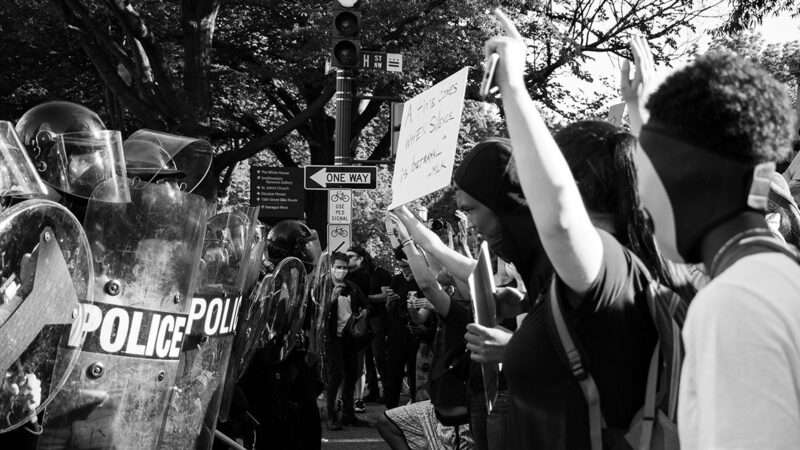
Despite predictions that rising violent crime would sink candidates who support criminal justice reforms, those candidates mostly survived their 2022 midterm elections. What's more, reform-minded prosecutor and sheriff candidates defeated incumbents in a few key races.
After the recall last year of progressive San Francisco District Attorney Chesa Boudin, opponents of criminal justice reform were confident that voters' concerns about high crime in the COVID-19 era would translate into a national backlash. Polling seemed to back them up: An ABC/Washington Post poll released in September found that 52 percent of respondents favored the Republican Party to handle crime, compared to 38 percent preferring Democrats. In a Greenberg Research survey that asked voters what they feared most if Democrats won full control of the government, 56 percent of respondents chose "crime and homelessness out of control in cities and police coming under attack."
"Criminal justice reform faces political buzzsaw as GOP hones its midterm message," was how one Politico headline from April put it.
But while rising crime created headwinds for candidates who supported criminal justice reform, the apocalyptic storm never quite arrived.
Democratic New York Gov. Kathy Hochul survived a challenge by Republican candidate Lee Zeldin, despite attacks linking her to the state's bail reforms and an endless stream of New York Post headlines depicting New York City as a gore-soaked hellscape. It was still a very good night for New York Republicans, but not good enough to put them over the top.
However, the bail reform backlash did appear in Ohio and Alabama, with both states passing ballot initiatives tightening the rules for releasing defendants before trial.
In Pennsylvania, Democratic Senate candidate John Fetterman won despite a barrage of Republican attacks on his criminal justice record, such as serving on the parole board, opposing life sentences, and supporting progressive Philadelphia District Attorney Larry Krasner.
In Oregon, another state where Republicans were hoping crime, homelessness, and general dysfunction would propel them to the governor's seat for the first time since 1982, Democratic candidate Tina Kotek defeated her Republican opponent, 47 percent to 43 percent.
Down the ballot is where things got more interesting.
In Los Angeles, dictatorial Sheriff Alex Villanueva, who originally ran as a Democrat promising reforms, was trounced by challenger Robert Luna. Villanueva had been embroiled in a series of baroque scandals and drama for much of his tenure, using his powers to retaliate against whistleblowers, reporters, other city officials, and the inspector general's office that is supposed to oversee his department. Voters appear to have tired of the clown show.
Minneapolis voters elected Mary Moriarty, a career public defender, as their new district attorney. Moriarty defeated Martha Holton Dimick, a former district court judge and prosecutor who complained to Mother Jones that "defund the police" rhetoric "was basically giving the criminal element in our city and across the county the 'go-ahead and commit crimes' sign."
Voters also showed the door to Massachusetts' longest-serving sheriff, Republican Tom Hodgson. Hodgson was described as the "Arpaio of the east," a reference to former Maricopa County, Arizona, Sheriff Joe Arpaio, who was infamous for degrading conditions and constitutional abuses within his jail. Hodgson's jail had been dogged by suicides and allegations of medical neglect and unsanitary conditions.
In King County, Washington, Leesa Manion defeated Jim Ferrell in the race for county prosecutor. The Seattle Times reported that, while both served as prosecutors in the office, Ferrell had run on a platform of rolling back many of the reforms of the previous county prosecutor, such as certain prison diversion programs.
Civil rights attorney Pamela Price made history in California, where she will be the first black district attorney ever in Alameda County after defeating veteran prosecutor Terry Wiley.
Looking at the results, the conservative Manhattan Institute, which generally favors tougher laws, could only muster the enthusiasm to say that crime is still a concern for voters. "In an evening where Republicans underperformed expectations, an emphasis on public safety was still a boost, suggesting that voters across the spectrum still care about a sane criminal justice policy," Manhattan Institute fellow Charles Fain Lehman said.
Every election is the result of its own very specific time and circumstances, but one takeaway from the 2022 midterms is that criminal justice reform, as both a local and national issue, may not thrive during rises in crime, but it can survive.
The post Pundits Predicted a Backlash Against Criminal Justice Reform in the Midterms. What Happened? appeared first on Reason.com.







